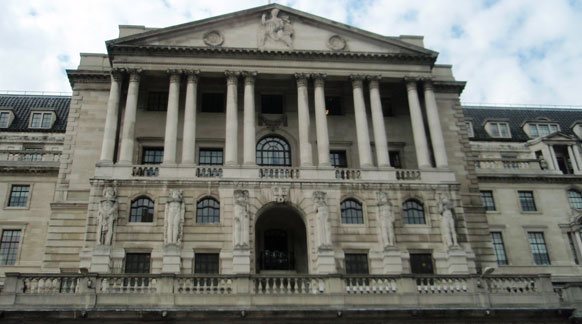Fitch: Brexit no direct impact on APAC sovereigns, Bank ratings
The UK's vote to leave the European Union "Brexit" has no immediate
direct ratings impact on Asia Pacific (APAC) sovereigns or banks, says
Fitch Ratings. The spike in political uncertainty in the UK and
resulting effects on investor risk appetite could pose the greatest
challenges for Asia in the short term.
If protracted uncertainty has a sustained effect on investor and
consumer confidence, the resulting tightened liquidity conditions and
pressure on emerging markets capital markets could weigh on growth in
the region. This is especially the case for more trade integrated
economies such as Singapore, Taiwan, Hong Kong and Korea.
|

The Royal Exchange, London. |
But it remains far from clear that such a sustained market reaction
will develop. Some of the negative 'risk off' market moves that occurred
in the immediate aftermath of the Brexit vote have already been partly
unwound this week. Furthermore, Asian market reaction has been far more
muted than in Europe.
The potential for developed market central banks to act, namely the
Fed slowing the pace of its rate increases, could also play a key role
in calming markets. The one outlier is Japan, where the immediate flight
to safety saw the yen spike upward versus the US dollar and other major
Asian currencies. This will add to the short-term challenges for Japan
to escape deflation as well as raise risks to the export sector.
The direct impact from UK trade on Asian economies is also likely to
be limited. The UK is the world's fifth largest economy, and Fitch
expects a slowdown in short-term GDP growth as a result of the
referendum. But exports to the UK equate to less than 1% of GDP and
account for less than 3.5% of total exports for every Asian country.
Over the long term, it is also possible that a UK outside the EU may be
able to make quicker progress on trade liberalisation with Asian
countries than as a member of the EU. Only Korea currently has a free
trade agreement with the EU among Fitch rated APAC countries (some
smaller Pacific island economies also have agreements).
The direct financial linkages are limited as well, and so the risks
are more indirect with respect to Asia's banking systems. But emerging
Asia accounts for less than 15% of the total external claims of UK
banks, according to BIS data. Singapore and Hong Kong, as offshore
financial centres, are more significantly exposed relative to the size
of their economies, but these are mainly local/regional claims from UK
subsidiaries and unlikely to see significant withdrawal as a result of
Brexit.
Indirect trade effects should the Brexit vote lead to wider political
instability and a broader slowdown in Europe could be more significant
for Asia, with the EU as a whole accounting for a much larger share of
Asian exports than the UK alone. But the effects should take time to
materialise, and Fitch believes that it is the smaller economies in
Europe that are most at risk from Brexit as opposed to the larger
economies such as Germany and France which account for the bulk of Asian
exports. Fitch maintains its base case for APAC sovereigns and banks.
Emerging Asia will remain the fastest growing global region. Rising
political uncertainty in Europe may lead to some downward revisions to
regional growth projections, depending on how serious this turns out to
be.
However, China is likely to remain a much more significant driver of
economic outcomes in APAC than Brexit, while risks from tightening US
monetary policy also remain a key challenge.
|

